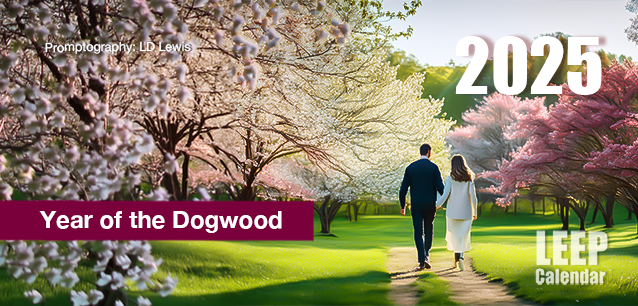 AD
AD
Today is: November 05
Scroll to explore events active on this date.
LEEP INK FEATURES

August? Absolutely!
In August, we live through the Dog Days of Summer. It's hot and often humid, and those who can leave for better climates do. Down south, winter is in full force. August is also known as "the ...

In The Heat of July: July 2025 Events
Is it hot enough (or cold enough if you're below the equator) for you yet? There is actually a day for that! Like every month, I pick a diverse collection of events you may or may not know about. This ...

May Blooms: Events in May 2025
Along with October, May is one of the most densely packed months of the year. It's before the summer humidity and the last whole month of the school year. The weather is warming in t...
About 2025, the Year of the Dogwood
Real Estate
Ends: Dec 31, 2025
DESCRIPTION:
SPRING'S HERALD:
2025 IS THE YEAR OF THE DOGWOOD TREE
The National Garden Bureau's designation of 2025 as the Year of the Dogwood Tree celebrates this beloved and versatile tree, renowned for its breathtaking spring blossoms, vibrant autumn foliage, and overall ornamental appeal. This recognition calls on all gardening enthusiasts and conservationists to cultivate and appreciate the beauty of dogwood trees in landscapes and gardens worldwide.
Dogwood trees belong to the genus Cornus and are known for their distinctive flowers, which are bracts that surround the actual flowers. They are deciduous trees or shrubs with species varying in size, from small to medium-sized trees. The most commonly known species is the flowering dogwood (Cornus florida).ORIGINS AND IDEAL GROWING CONDITIONS
Dogwood trees are native to temperate regions of North America, Europe, and Asia. They grow best in the following conditions:
—Partial Shade to Full Sun: While dogwoods can tolerate full sun, they thrive in partial shade, especially in hotter climates where they benefit from some protection from intense midday sun.
—Well-Drained, Acidic Soil: Dogwoods prefer well-drained, acidic soils rich in organic matter. They do not tolerate waterlogged conditions.
—Cool, Moist Climate: They thrive in cool, moist climates and can be sensitive to drought and extreme heat. However, they are susceptible to certain diseases and pests, such as powdery mildew and dogwood anthracnose, which can affect their health and appearance.MEDICINAL USES
Historically, various parts of the dogwood tree have been used in traditional medicine, though their use is less common in modern herbal practices. Some traditional uses include:
—Bark: Native Americans used the bark of certain dogwood species to treat pain and fever and as a quinine substitute for malaria.
—Leaves and Fruit: Infusions made from the leaves and fruit have been used for their astringent and antiseptic properties to treat wounds and digestive issues.
However, these uses are largely historical, and dogwoods have yet to be widely recognized in contemporary medicinal practices.POPULARITY AND APPEAL
Dogwood trees are popular for several reasons:
—Aesthetic Appeal: Dogwoods are highly valued for their beautiful spring blooms, which range from white to pink to red. Their bright red or purple fall foliage and attractive branching patterns add to their year-round visual interest.
—Wildlife Support: Dogwood trees produce berries, a valuable food source for birds and other wildlife. The trees also provide habitat and shelter for various species.
—Versatility: Dogwoods, with their moderate size and adaptability, can be used in various landscape settings, from garden focal points to woodland edges. This versatility makes them fascinating subjects for horticulture enthusiasts and conservationists alike.
—Cultural Significance: Dogwoods hold cultural and historical significance in many regions, symbolizing beauty, purity, and durability. This rich cultural heritage adds to their appeal to gardening enthusiasts and conservationists.
The Year of the Dogwood Tree aims to celebrate and promote dogwood trees' numerous benefits and beauty. This initiative seeks to raise awareness about their ecological and ornamental value, encouraging more people to plant and care for them in their communities and gardens.
VIDEOS
SUPPORTING DOCUMENTS
Currently, this event does not have supporting documents.
ADDITIONAL IMAGES
Currently, this event does not have supporting images.
Where would you like to go now?
 AD
AD


/footer-logo.svg)
